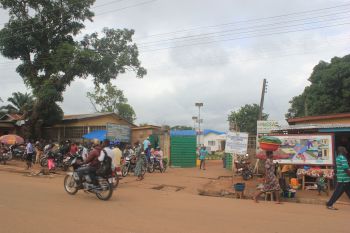Ebola Response Network wins top prize for providing vital advice to humanitarian teams
By: James Hakner
Last updated: Friday, 24 June 2016

A hospital in Kenema, Sierra Leone, West Africa, where Ebola virus samples were tested to see if someone had the virus or not. By Leasmhar (Own work) [CC BY-SA 3.0 (http://creativecommons.org/licenses/by-sa/3.0)], via Wikimedia Commons
An online network which helped social scientists and humanitarian control teams to work with each other during last year’s West Africa Ebola outbreak, has been awarded the Economic and Social Research Council’s (ESRC) Outstanding International Impact prize.
The Ebola Response Anthropology Platform, which has been awarded the £10,000 prize, includes scientists from the University of Sussex, the Institute of Development Studies, the University of Exeter and the London School of Hygiene and Tropical Medicine.
The prize, which is given to social science researchers who have achieved impact through outstanding research, collaborative partnerships and engagement activities, was awarded to the team at the ESRC ceremony at Central Hall in London.
The Ebola Response Network enabled social scientists and outbreak control teams on the ground to develop a coordinated response to last year’s outbreak – with social scientists ensuring that local response teams were given practical, real-time advice on the socio-cultural and political dimensions of the outbreak.
Professor James Fairhead, from the University of Sussex, said: "The Ebola epidemic remains a tragedy for those affected, and we sought to help like so many others.
“As the Ebola epidemic was as much an epidemic of mistrust as of a virus, the part we played in the Ebola Response Anthropology Platform was to help humanitarian agencies understand political tensions and local customs, rebuild trust and enable more respectful engagement with affected communities.
“It highlighted the very real value of anthropology to government policy and might provide a model for future epidemic responses."
Sussex researchers were also commended for the impact of their research on policy practice. Professor Jane Oakhill (Psychology) finished runner-up in the Outstanding Impact on Society category for her research into improving primary school children's reading comprehension. The research has had a direct impact on educational practice, shaping national policy and improving the way reading comprehension is taught.
